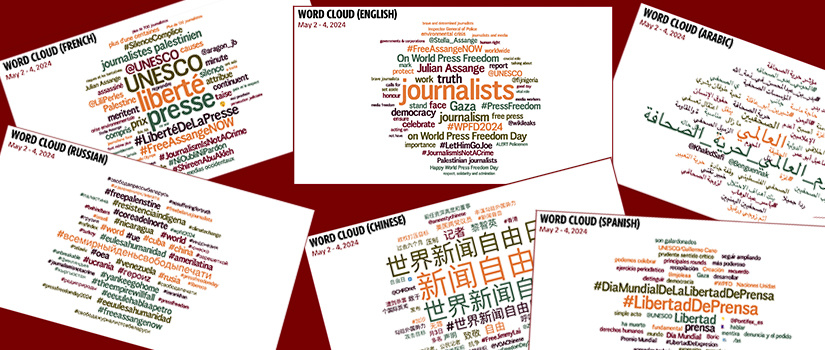UNESCO’s World Press Freedom Day on May 3 prompted a global social media conversation on issues of media freedom and journalist safety, according to an analysis by the Social Media Insights Lab at the University of South Carolina.
The lab’s Quid software used artificial intelligence to identify 285,000 mentions worldwide that were seen in more than five billion social media feeds.
“World Press Freedom focuses the world’s attention on these important topics and this year the war in Gaza clearly influenced many of these conversations,” said St Cyr Luttmer, lab coordinator. “The Twitter author who received the most engagement was Palestinian photojournalist Motaz Azaiza, who built a large online following as he risked his life to document what was happening around him.”
Other influential posts came from world leaders like Pope Francis, Canadian Prime Minister Justin Trudeau and UN Secretary-General Antonio Guterres.
The comments, primarily on X (formerly known as Twitter), were made in more than 40 languages. Almost two-thirds of the posts were in English followed by Spanish, Arabic and Hindi.
The largest number of posts came from the United States (32,000), followed by India (16,000) and the United Kingdom (9,000). Not surprisingly, there was much less interest in countries without media freedom such as Russia (only 189 mentions) and China (421 mentions).
Many posts were in support of Julian Assange, the founder of WikiLeaks who is in British custody and facing extradition to the U.S. on espionage charges. The hashtag #freeassangenow was used in almost 18,000 posts.
“The theme of World Press Freedom Day this year was a A Press for the Planet: Journalism in the Face of the Environmental Crisis,” said Luttmer. “While we did find posts discussing the environment, there were far more focusing on press freedom and Julian Assange.”
The U.N. General Assembly proclaimed the first World Press Freedom Day in 1993. Each year since on May 3, UNESCO has used the day to celebrate the fundamental principles of press freedom, to evaluate press freedom around the world, to defend the media from attacks on their independence and to pay tribute to journalists who have sacrificed and sometimes lost their lives in the exercise of their profession. This year’s observance was held over three days in Santiago, Chile.
To prepare this report, the lab looked at posts made between May 2 and 4, 2024, using search terms in six languages: English, Spanish, French, Russian, Chinese and Arabic. Most of the comments came from X/Twitter (96.2 percent) with 3 percent coming from news mentions and the rest from various blogs.
About the Social Media Insights Lab
The lab is part of the University of South Carolina College of Information and Communications. Its powerful Quid software can analyze massive amounts of information across social media platforms, bringing insights and understanding to complex questions and issues. The lab is used for teaching, academic research and public reports intended to help people better understand issues of the day. View a full list of reports and follow the lab on X (Twitter) at @UofSCInsights
